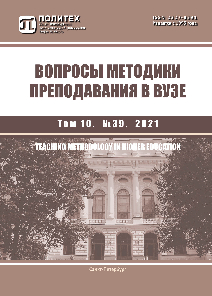Interpretation contest as an active form of learning and a way to enhance students' professional potential
The article analyzes the interpretation contests for students held over six years (2017−2022) in terms of their educational and career guidance potential. The uniqueness of interpretation competitions, as opposed to the written translation ones, is outlined. The methodological aspects of the organization and holding of the annual international Student interpretation contest in online, offline and hybrid formats are considered. The proposed historical overview of such competitions represents the growth in the number of participants and the geographical coverage, proving that interpretation competitions are an effective instrument of developing the professional potential of future translators. The specificities of the jury work at the contest are described, as well as the problem of the quality of interpretation evaluation criteria, and a solution is proposed for the effective evaluation of the contestants' work. Feedback analysis from the contestants and jury members allows us to conclude that such contests are an active form of teaching interpretation and an effective means of motivating and developing students' professional competencies. Such contests help students to gain interpreting experience in stressful and close to reality environment, and also to adjust the student's self-esteem, giving an incentive to work independently to improve their professional skills, which also contributes to the formation of a professional interpreter.



